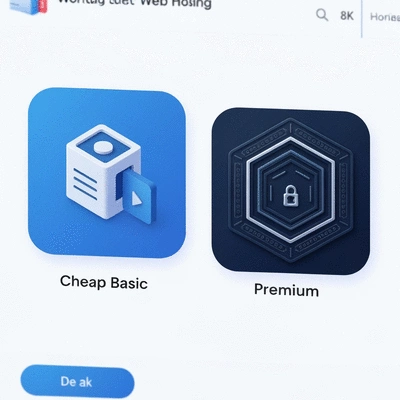Cost-Effectiveness
Cheap Hosting
Low initial investment
Premium Hosting
Higher, long-term value

As you consider your web hosting options, have you thought about what "cheap" really means? While it might sound like a great deal, understanding the implications can be crucial for your online success.
This visual highlights the key distinctions between cheap and premium web hosting options across various crucial aspects, helping you make an informed decision for your online presence.
Cheap Hosting
Low initial investment
Premium Hosting
Higher, long-term value
Cheap Hosting
Slower speeds, shared resources
Premium Hosting
Faster speeds, better uptime
Cheap Hosting
Variable quality, slower response
Premium Hosting
24/7 expert assistance
Cheap Hosting
Basic measures, higher vulnerability
Premium Hosting
Advanced features, robust protection
When starting your online journey, the idea of cheap web hosting often comes up as an appealing option. But what exactly does cheap web hosting entail? In simple terms, it’s a service that provides the space to host your website at a lower price point, usually through shared resources. This means multiple websites share the same server, which can significantly reduce costs. However, it’s essential to understand both the benefits and limitations before diving in!

Cheap web hosting can be defined as a budget-friendly option ideal for individuals or small businesses looking to establish an online presence without breaking the bank. It allows you to get started with minimal investment while gaining access to essential tools and features. However, keep in mind that the term "cheap" doesn’t always equate to low quality, but it can come with specific compromises.
This type of hosting is excellent for beginners who are just testing the waters but may not be the best fit for larger or more complex websites.
When considering cheap web hosting, it’s crucial to know what features you can expect. Generally, these services come with a set of standard offerings that cater to budget-conscious users. For insights into the broader web hosting market, you might find this ultimate web hosting statistics and market share report helpful. Here are a few key features to keep in mind:
While these features can be sufficient for many, it’s important to consider performance limitations, security concerns, and support availability when selecting your hosting provider.
As appealing as cheap web hosting can be, it often comes with performance limitations. Shared hosting means your site’s speed and uptime might be affected by other sites on the same server, potentially impacting your site's SEO. This can lead to slower load times, especially during peak traffic hours. If you’re expecting high traffic, you might find cheap hosting isn’t enough.
Security is another vital consideration. With shared hosting, you share the server with potentially less secure sites, which can increase vulnerabilities. Although many cheap hosting providers implement basic security measures, they may not offer robust features like advanced firewalls or regular backups. It’s crucial to evaluate the security protocols in place before committing, and these web hosting statistics can shed more light on common security trends.
Customer support is often a mixed bag with cheap hosting services. Many provide 24/7 support, but response times may be slower, and the quality of assistance can vary. If you run into issues, you might find that waiting on hold for help isn’t ideal for maintaining your online presence. It’s a good idea to check reviews of the hosting provider’s support before making a choice!
Several well-known providers offer cheap shared hosting plans that cater to various needs. Here are some popular options you might consider:
These providers usually offer competitive pricing and basic features, making them a good starting point for your online venture. Just remember, as your site grows, you may need to reassess if cheap web hosting will continue to meet your needs.
When choosing a cheap web hosting provider, always look beyond the price. Evaluate the provider's uptime guarantees, customer support quality, and security measures. A slightly higher investment can save you from potential headaches and lost revenue down the line!
Cheap web hosting is a budget-friendly service that provides space for your website, typically through shared server resources, meaning multiple websites share the same server to reduce costs.
It is ideal for beginners, small businesses, or individuals looking to establish an online presence with minimal initial investment. It's suitable for those testing the waters or running simple websites.
The main limitations include slower speeds, potential downtime due to shared resources, basic security measures leading to higher vulnerability, and variable quality of customer support.
You should consider upgrading if your website experiences significant growth, if you plan to launch an e-commerce site, if you require specialized features, or if you need enhanced performance, security, and dedicated support.
Beyond price, evaluate the provider's uptime guarantees, the quality and availability of customer support, the security measures in place, and whether the features align with your website's current and future needs.
As we wrap up our discussion on cheap versus premium web hosting, it's essential to reflect on the primary differences between the two options. Cheap web hosting often appeals due to its budget-friendly pricing, but it comes with caveats like limited resources and potential security issues. Conversely, premium hosting services provide enhanced performance, better support, and robust security features, making them worth considering for serious entrepreneurs. Understanding these factors will help you make an informed decision that aligns with your online goals.
In short, both options have their merits, but your choice should ultimately depend on your specific needs. If you're a casual blogger or just starting out, a cheap hosting plan might suffice. However, if you're running a business or anticipate growth, premium hosting could be a valuable investment in your online success.

By weighing these insights, you can determine which hosting option best suits your needs. Remember, investing in a premium service today could lead to significant advantages as your online presence grows.
Deciding when to invest more in your web hosting is crucial for your online strategy. If you're experiencing growth or plan to launch an eCommerce site, premium hosting can offer the necessary performance and reliability. It's all about matching your hosting choice to the level of commitment you have toward your business goals.
Consider these scenarios where investing in premium hosting might be the right move:
At All for Domains, we understand the importance of making the right choice for your online journey. We're here to guide you through these decisions and help you find the best hosting solution for your unique situation! For more guidance on selecting the right service, explore these 10 tips for choosing the right web hosting company.
Once you've made the decision between cheap and premium hosting, the next steps involve ensuring a smooth transition. If you opt for premium hosting after starting with a cheaper option, migrating your site effectively is key.
Here’s a simple guide to help you transition from cheap hosting to a more robust premium option:
Utilizing migration services can significantly reduce the stress of moving to a new host, allowing you to focus on what you do best—running your business!
I’d love to hear from you! What hosting decisions have you faced in your online journey? Have you experienced the difference between cheap and premium hosting? Share your thoughts in the comments below! Engaging with fellow readers can provide valuable insights that enhance our community knowledge.
Remember, the right hosting solution is just a conversation away. Let’s dive into the digital landscape together!
Here is a quick recap of the important points discussed in the article:
Domain Management Tools You Need

Every successful online venture starts with strong domain management. Are you ready to master the fu
Understanding Web Hosting Hidden Costs

Have you ever signed up for a service only to find out that the cost skyrockets after the first year
Understanding Uptime Guarantees in Hosting

What if a mere percentage could determine the success of your online presence? Understanding uptime
Domain Management Tools You Need
Understanding Web Hosting Hidden Costs
Understanding Uptime Guarantees in Hosting
Understanding Domain Names and SEO
Competitor SEO Analysis Made Simple